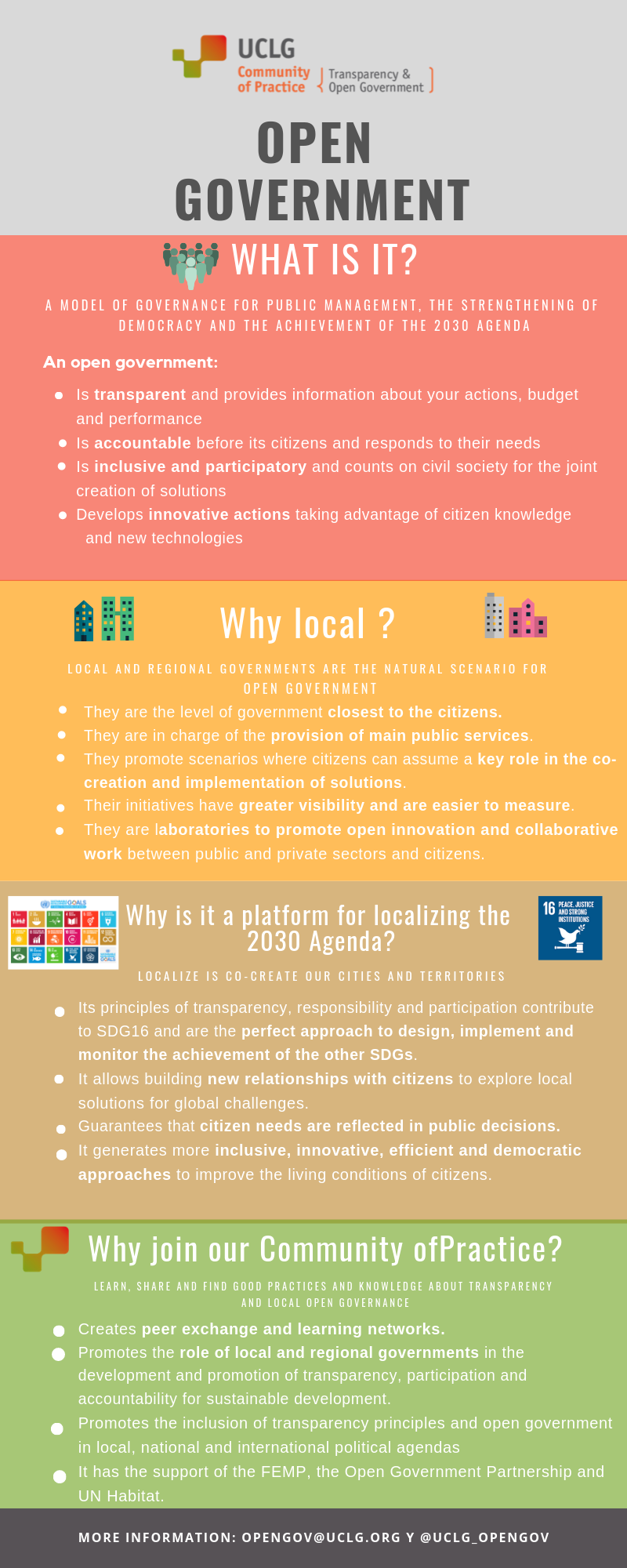Open governments

What is Open Government?
Open Government is a model of governance based on the principles of transparency, accountability and participation, which, helped by new technologies and innovation, constitutes a new alternative for public management and the strengthening of public administration and democracy, being a platform for the achievement of global agendas.
An open government is transparent, it provides information and data about its actions, budgets and performance. It is accountable to society and responsive to citizen’s needs. It fosters the traceability of public decisions, allowing continuous and adequate social control by citizens, improving public management. An open government is inclusive and participatory, allowing citizens to be involved in the formulation, implementation and follow up of public policies. It is the place where public administration opens to the talents emerging from citizens and other stakeholders by co-creating ideas for better public management. It goes beyond the concept of e-Government, by becoming a driver of innovation and value creation, and profiting from citizen knowledge and SMART technologies as tools to transform and enhance the reach and impact of its action. Finally, an open government recognizes the need to rethink the way the public operates, changing values and principles governing public sector priorities and performance, promoting and generating trust and building stronger, more open and more effective institutions.
Local leaders around the world are building cities and territories that co-innovate, co-create and co-design policies, services, tools and solutions together with citizens; producing some of the most iconic examples of open government initiatives.
Why local governments are a natural space for advancing on the Open Government Agenda?
- Many innovations and open government reforms occur at the local and regional level, because that is where governments can collaborate with citizens more directly.
- They are level of government closest to people and often they are the first (and frequently the only) point of access to government.
- They have a wider knowledge of their territories and are the entities that directly connect national and global strategies with local realities, and with the citizens.
- They are in charge of the provision of a large part of public services and key to define the development and creation of the main public policies.
- Citizen participation is greater at the local level and so citizens can assume a key role in the co-creation and implementation of solutions.
They have become laboratories to promote open innovation and collaborative work between citizens and governments and have important potential to improve the quality of the public sector and democracy and renew trust.
Open Government is a platform to localize the Sustainable Development Goals and the implementation of the 2030 Agenda

The 2030 Agenda for Sustainable Development has recognized that sustainable development is impossible to achieve without local leadership. The process of "localization" of the 2030 Agenda goes beyond the simple adaptation of the global objectives to the local level and today implies moving towards the idea of co-creation of our cities and territories, where local and regional governments build and facilitate new relationships with citizens to explore joint solutions at the local level that respond to global challenges and objectives.
Open government offers a new platform to support cities to localize the SDGs. Its principles of transparency, responsibility and participation contribute directly to the achievement of the Sustainable Development Goal 16, on peace, justice and solid institutions but are also the best approach through which cities can design, implement and monitor the achievement of all other SDGs or any development agenda.
The development of open government policies and principles in strategies for achieving the SDGs will ensure that public needs are reflected in decisions, generating more inclusive approaches to improve the living conditions of citizens. This will encourage, for example, women's participation and empowerment, social economic and political inclusion, inclusive services of water and sanitation, and safer cities. By using this approach, cities also foster innovative solutions to lessen costs in the short term and to win trust and legitimacy and strengthen good governance, effective public management and democracy, in the long term.

